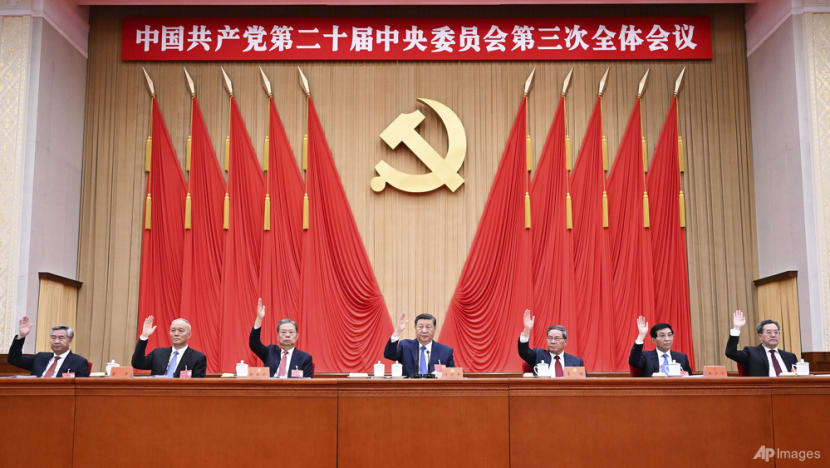Commentary: Watch what China does, not just what it says, after unsurprising economic plenum
Businesses and investors should keep their eyes on China’s actions after the third plenum concluded without surprises. Perhaps the most telling sign is that the party specified a timeline to achieve the reforms, says Penta Group’s Hong Kong managing director Thomas Kwan.

Members of the Politburo Standing Committee attend the third plenary session of the 20th Communist Party of China Central Committee held from Jul 15 to 18 in Beijing. (Photo: Xie Huanchi/Xinhua via AP)

This audio is generated by an AI tool.
HONG KONG: The third plenum of China’s Communist Party (CCP) concluded recently without new stimulus or deep reforms, but that does not mean there isn’t welcoming news.
While the communique released after the closed-door meeting led by President Xi Jinping contained few surprises, it could also be viewed as maintaining stability and certainty. In a major election year for many countries where we have already seen drastic changes or uncertainties in governments, the less-than-surprising outcome may provide what the market seeks in an uncertain world.
The broad goals emphasised in the plenum have not changed - economic recovery, technological innovation, market reforms.
Despite its economic challenges, China seems more cognisant that any drastic measures may introduce volatility and potentially derail plans in achieving its 5 per cent growth target for 2024.
LONG-TERM SHIFT VS SHORT-TERM STIMULUS?
A long-term shift is what the world’s second-largest economy is gunning for, when the drivers of its meteoric rise have been slowing down.
Before the plenum, official data showed the Chinese economy expanded by just 4.7 per cent in the second quarter this year, among its slowest growth in recent years. When combined with the first quarter data of 5.3 per cent growth, China may still be on track to meet its year-end target.
But for the market, it may be cutting too close for comfort, given the short-term challenges ahead. This may explain why the plenum has focused on the long term, and placed emphasis on enhancing people’s quality of life as one of the means to boost overall consumption which some economists have been urging for, among others.
Still, the plenum offered some positive signals for businesses.
One of the most notable aspects of the communique was the emphasis on giving "fuller play to the role of market mechanisms", which could increase efficiency and competition, reduce bureaucracy and regulatory hurdles, and enhance the role of the private sector.
Businesses could have more freedom to innovate and compete. Better products and services for consumers could be a more reliable way of addressing sluggish domestic consumption and shift to consumption-led growth. In addition, the aim of unleashing the consumption power of people in rural areas and giving them access to urban public services may have a trickle effect on boosting overall consumer demand in the country.
Fewer regulatory hurdles could allow quicker adaptation to market demands, crucial in tech-heavy sectors that Beijing is targeting as “future industries” for more innovation-led growth.
That said, China also aims to “build a high-level socialist market economy system”, so the pace of reform and growth may not be at the same pace that other markets are accustomed to. The silver lining is that the plenum affirmed the need to address market inefficiencies, which can be taken as a sign that the country acknowledges there is work to be done to bridge the expectations gaps.
UNCERTAINTY IN IMPLEMENTATION
But the lack of detailed implementation plans creates uncertainty for businesses at a time when foreign direct investment shrank 29.1 per cent year-on-year to US$49.9 billion in June.
For tech companies, the emphasis on innovation and self-reliance is a double-edged sword: It opens up opportunities for growth, but the absence of detailed policies on funding and regulatory support needed to make informed investment decisions can hinder long-term planning.
Similarly, financial institutions are left guessing about the specifics of financial market reforms and regulatory changes, which are crucial for future investments and risk management.
The property market, already facing a significant slump, remains volatile without clear policies to stabilise prices and address debt issues. Similarly, infrastructure projects depend heavily on local government funding and stability. Suggestions of local government tax reforms may sound intuitive, but the lack of concreate policies or directives at this stage may complicate long-term planning and investment in public projects, affecting sectors reliant on local incentives and infrastructure development.
Consumer goods companies involved in export-import activities face uncertainty regarding tariffs, trade agreements, and market access, impacting their global operations.
WATCH WHAT CHINA DOES, NOT JUST WHAT IT SAYS
That said, businesses and investors should watch what China does, not just what it says.
There are useful policies that are already in place, such as the Real World Evidence (RWE) programmes for medical technology companies entering China. The first RWE programme, launched in Hainan province in 2019 and followed by the Greater Bay Area in 2020, gives medtech companies early access to the market through trials and studies for rare diseases and clinically urgent needs, and the opportunity to fast-track regulatory approvals, reimbursement listing, and/or commercialisation, potentially enabling them to influence and shape the market.
The plenum stated that it is focused on creating a “beautiful China”, by accelerating green transformation and pursuing green, low-carbon development, among others. This alone may not say much.
But if taken together with its directions of improving the mechanism for modern infrastructure construction and the resilience and security of industrial supply chains, the opportunities in environmental sustainability could be vast.
For instance, the plenum proposed deeper reforms of its railway system and further develop the “low-altitude economy” (such as drones and flying cars). This means demand for renewable energy will likely increase. The need to secure the supply chain in the production of these assets would be critical.
Perhaps the most telling sign that businesses should keep their eyes on China’s actions is that the plenum specified a timeline to achieve the reforms. In past plenums, the CCP had not set such timelines.
This time, unusually, Beijing has given clear indication of a 2029 deadline - an important year as the People’s Republic of China celebrates its 80th anniversary. Some analysts see this as an effort to focus the CCP on implementing the reforms.
This, in a way, provides a direction for businesses and markets on China’s roadmap.
While the road ahead is fraught with challenges, businesses that can navigate these complexities and leverage emerging opportunities will be well-positioned to thrive.
Thomas Kwan is Managing Director of Hong Kong at Penta Group.

















